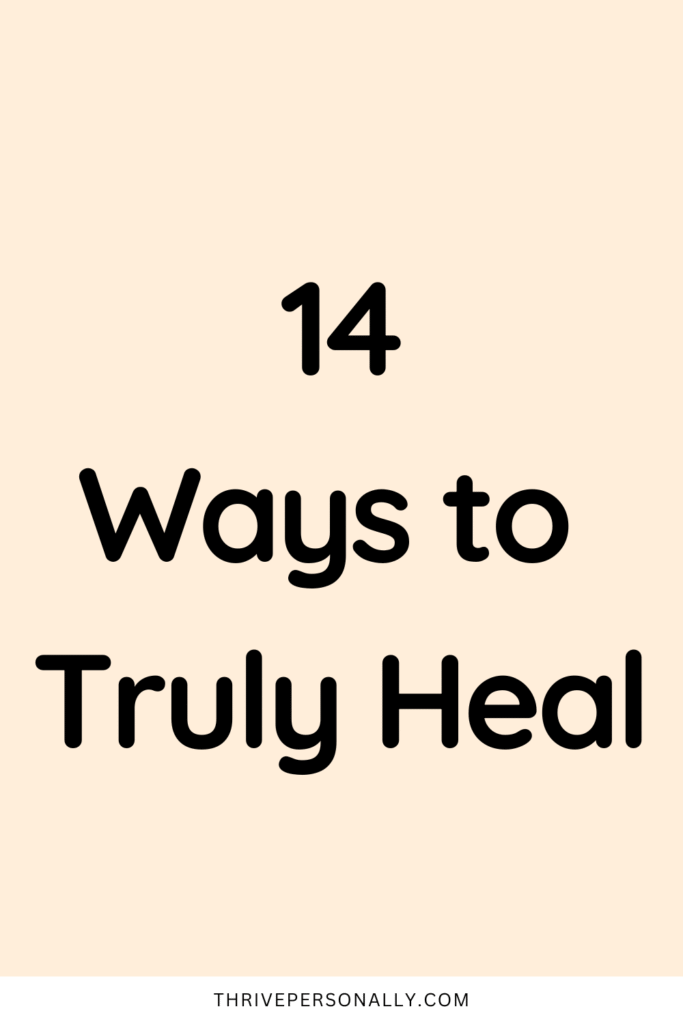I once thought healing was a direct path — like crossing a bridge, one step after another until you reach the other side. But as life unfolded, I learned there’s no neat, predetermined path to recovery. It’s a crooked line, with unexpected pitfalls and steps that sometimes seem to go backward.
Some days, I felt completely fine. Then I’d wake up the next morning feeling like the pain had returned overnight.
I’ve since realized that healing isn’t about shaking off pain in one stroke. It’s about learning to live with your scars and finding peace in spite of them. It’s not about erasing the past, but about slowly building a new life that isn’t defined by old wounds. Recovery is a process — a daily choice that may seem small in the moment, but matters more than we imagine.
14 Effective Ways to Truly Heal
1. Let Go of the Idea of Instant Cure
Healing can’t be rushed. The faster you try to force it, the longer it often takes. Pain doesn’t follow a schedule — and neither should your recovery. Move at a pace that feels right for you, without comparing yourself to others. Healing is a journey, and you can take as much time as you need.
Read also: 5 Daily Habits for a Healthy Mindset
2. Stop Hiding from Your Feelings
Being afraid of your emotions is one of the most damaging things you can do to yourself. Burying them won’t make them disappear — they’ll simply resurface in other, often more painful ways.
Allow yourself to feel them. Name them. Acknowledge them. Only by experiencing your emotions can you eventually release them.
3. Accept That Closure May Never Come
Sometimes, healing doesn’t have a perfect ending or clear answers to every question. Waiting for someone else to give you closure could mean waiting forever.
Closure comes when you decide to move forward — even if you don’t have all the answers.
Read also: 50 Emotional Intelligence Tips You Can Try
4. Care for Your Body as You Heal Your Mind
Your emotional health is closely tied to your physical well-being. It’s harder to heal emotionally when your body is neglected.
Make time to rest, drink enough water, and move your body — even a 10-minute walk can help. These simple habits can have a surprisingly big impact on your ability to process emotional pain.
Read also: 8 Ways to Heal from Childhood Traumas
5. Surround Yourself with Supportive People
You don’t have to heal alone. Seek out people who listen without judgment and genuinely want to see you thrive. Their presence can help ground you when you feel emotionally unsteady.
6. Protect Your Boundaries
You can’t fully heal if you keep letting people or situations reopen your wounds. Boundaries aren’t selfish — they’re necessary for your mental health.
Decide what you will and won’t tolerate, and protect that space even if others don’t understand. Your health comes before anyone’s opinion.
7. Seek Help Beyond Yourself
You don’t have to do everything alone. A therapist or counselor can give you tools to manage pain more constructively.
The American Psychological Association notes that therapy can improve emotional well-being and overall life satisfaction. Even a heartfelt conversation with a trusted friend can lighten the load.
8. Stop Living in the Past
Replaying old memories and wishing things were different keeps you stuck. When you notice yourself drifting back into painful recollections, gently redirect your focus toward what you can do right now to improve your situation.
9. Redefine Yourself Beyond the Pain
You won’t be the same person you were before the hurt — and that’s not a bad thing. You’re not broken; you’re evolving.
Explore new interests, meet new people, and learn new skills. Growth is one of the most powerful signs of healing.
10. Practice Forgiveness for Your Own Peace
Forgiveness isn’t about saying what happened was okay. It’s about choosing to stop letting it control your life.
This can’t be rushed — it might involve journaling, meditation, or spending time in nature. When forgiveness comes, it feels like putting down a weight you no longer need to carry.
11. Build Daily Habits that Support Healing
Healing is easier when your daily life is structured around habits that keep you balanced. Even brief mindfulness can reduce stress and boost mental health (source).
The more you protect your peace, the more steadily you can move forward.
12. Remember That Setbacks Don’t Mean Failure
Some days, you’ll feel like you’ve gone backward. That’s normal. Healing has highs and lows.
When setbacks happen, remind yourself they’re part of the process — not proof that you’ve failed.
13. Create Things to Look Forward To
Research shows that anticipating positive events can increase happiness and motivation (source). Plan activities, big or small, that excite you.
Shifting your focus from what you’ve lost to what you have ahead helps restore your sense of future.
14. Hold on to Belief in Yourself
No matter how much pain you feel now, this isn’t the end of your story. Recovery may take longer than you’d like, but each day you choose to keep going, you move closer to a stronger version of yourself.
Believing in your own ability to heal is half the battle — even if you can’t see the results yet.
Final Thoughts
Recovery isn’t a single moment where everything feels okay. It’s a collection of small, daily choices to care for yourself, guard your peace, and give yourself room to grow.
Save the pin for later



